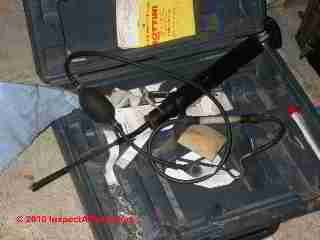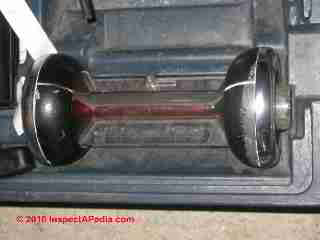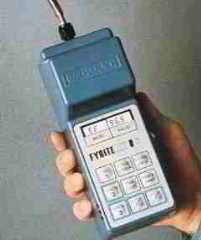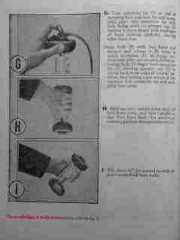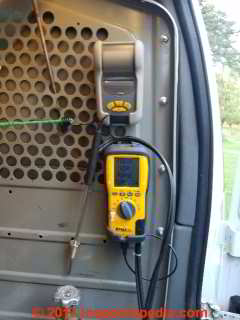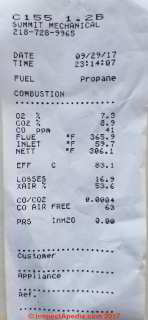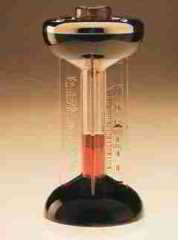 Oil Burner Carbon Dioxide Test
Oil Burner Carbon Dioxide Test
How to Measure & Set Oil Burner CO2 or O2 Levels
for Efficient Oil Burner Operation
- POST a QUESTION or COMMENT about oil burner performance tests and measurements
Oil burner carbon dioxide level testing, which in turn reflects combustion air & temperature adjustment is necessary for safe, efficient and reliable oil burner operation: this article explains and illustrates how an oil burner CO2 test is performed - a key step in oil burner adjustment.
We include charts showing the standard ratios or relations between an oil burner CO2 level (measured in the exhaust flue) and its O2 level, an alternative measurement of combustion quality.
An oil burner adjustment of combustion air, operating temperature, oil pressure, and other factors such as nozzle spray pattern selection all affect the completeness of combustion which in turn is reflected in the CO2 level measured in flue gas exhaust sampled in the breech. Page top image: the traditional Fyrite CO2 tester from a Bacharach oil burner tuning kit.
This article series answers most questions about central hot water heating system troubleshooting, inspection, diagnosis, and repairs. We describe how to inspect, troubleshoot and repair heating and air conditioning systems to inform home owners, buyers, and home inspectors of common heating system defects.
InspectAPedia tolerates no conflicts of interest. We have no relationship with advertisers, products, or services discussed at this website.
- Daniel Friedman, Publisher/Editor/Author - See WHO ARE WE?
Oil Burner CO2 Test - Carbon Dioxide Level Indicates System Efficiency
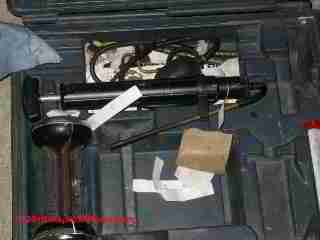 If the oil burner is not working, start your diagnosis
If the oil burner is not working, start your diagnosis
at OIL BURNER INSPECTION & REPAIR.
[Click to enlarge any image]
The basic measurements made by any competent oil heat service technician include the stack temperature, draft, smoke level, and carbon dioxide level.
Along with OIL BURNER SMOKE TEST, the second common test performed by an oil heat technician evaluates the oil burner efficiency by measuring the carbon dioxide level or CO2 level in the oil burner exhaust.
While there are electronic sensors used by some technicians for this purpose, many oil heat service tech's continue to use the time-tested Bachrach Fyrite™ oil burner tester shown below.
Our photos show the rubber bulb and tubing used to pump oil burner exhaust gases into the CO2 level tester (the bulb and tubing atop the smoke tester, above left),
and a closeup of a well-used CO2 tester (below).
Measurement is made at the same flue vent connector location as we discussed above.
Shown at left, a modern approach to measuring CO2 using the Fyrite II from Bachrach.
Watch out: if your heating oil company does not provide working test equipment for the service technician, setting the oil burner adjustments is going to be done by guesswork.
The result is likely to be either higher heating costs over the season for a system that is running too hot, or higher heating service costs for a system that runs too dirty.
In fact when the author (DF) attended oil burner school we were taught to make two openings into the flue so that smoke level and CO2 measurements could be made through one opening while a thermometer or draft gauge monitored those two additional data points at the second opening.
- The CO2 tester is filled with a red fluid that changes volume in response to carbon dioxide level. The Fyrite test unit is inverted, returned to upright, tilted at 45 degrees, to prepare it for use and to calibrate or set the "zero point" on the CO2 gauge.
A cap on the unit is depressed to vent the unit to the atmosphere and the zero point is set on the adjustable gauge. - Exhaust gas is pumped into the CO2 tester, the tester is treated with flue gas exhaust for the required number of strokes (18) to purge the tubing and bulb and analyzer (tester).
Why so many puffs of the rubber bulb? Remember you have to purge ambient air out of the tubing, the bulb, and the test instrument to be sure your sample in the instrument is of flue gas. - The analyzer is inverted, then returned to upright, tilted 45 degrees, returned to upright, and
- The CO2 scale is read.
The Carbon Dioxide vs Oil Burner Efficiency chart below explains how the percent of carbon dioxide in oil burner exhaust gases translates into oil burner efficiency. Bachrach Fyrite instructions and Oil Burner efficiency chart below, source: Audel's Oil Burner Guide.
Oil Combustion Efficiency vs Stack Temperature
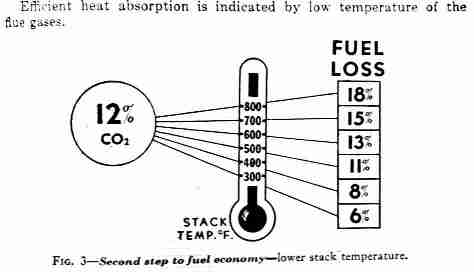 The chart at left illustrates combustion efficiency, stated as fuel loss at an oil burner, for a given CO2 level at different stack temperatures.
The chart at left illustrates combustion efficiency, stated as fuel loss at an oil burner, for a given CO2 level at different stack temperatures.
[Click any image or table to see an enlarged, detailed version.]
Watch out: It's easy to make it look as if oil burner has been set for very high efficiency: just stand with your leg blocking the air intake at the oil burner air shutter while making the CO2 measurement.
But that nonsense, while it may make the burner adjustment look "good" is likely to waste fuel during the heating season and may result in smoky sooty operation leading to a loss of heat.
We want good oil burner efficiency, up to the point of improper operation.
The illustrations at left and below, from our Bachrach manual, explain how the Fyrite CO2 analyzer is operated and give a chart useful to read oil burner efficiency levels for different CO2 levels at different operating temperatures.
Combustion Analyzer Recommendations & Sources of Oil or Gas Burner Combustion Testing Kits include CO2 Measuring Devices
- Bachrach Inc. provides the Fyrit ® Classic Oil Kit (shown in the case photos above) for testing oil or gas burners, as well as a number of other test instruments such as the Fyright® Insight® Plus (electronic), Fyrite Intech®, the ECA450, and the PCA 3 portable combustion analyzer.
Website: http://www.bacharach-inc.com/combustion-test-kits.htm, Bacharach Sales/Service Center 621 Hunt Valley Circle New Kensington, PA 15068-7074 Tel: 724-334-5000 Fax: 724-334-5704 E-mail: Help@MyBacharach.com
UEI Eagle produces a range of test instruments used for heating system analysis and tuning. Shown above, UEI Eagle test instruments, mounted magnetically to the service truck wall. These tools were used to measure the performance of an LP gas fired heating boiler in Two Harbors MN.
The second image above shows the Eagle test instrument report printed at the job site. [Click to enlarge any image]
- UEI Eagle Test Instruments, UEI 675 combustion analyzer ($775 U.S. Amazon.com), Uei D460 Draft Gauge, Website: http://www.ueitest.com/,
UEI Test Instruments, Portland, OR 8030 SW Nimbus
Beaverton, OR 97008
Tel: 503 644-8723
Tel: 1-800-547-5740
Fax: 503 643-6322
Email: info@ueitest.com
or
UEI Test Instruments, 8030 SW Nimbus Beaverton, OR 97008 Tel: 503 644-8723 Tel: 1-800-547-5740 Fax: 503 643-6322 Email: info@ueitest.com
Also see COMPLETE COMBUSTION, STOICHIOMETRIC for an explanation of complete fuel combustion and boiler or furnace maximum efficiency.
The articles at this website describe how to recognize common oil-fired heating appliance operating or safety defects, and how to save money on home heating costs.
Readers should see HEATING SYSTEM INSPECTION PROCEDURE.
There we explain an organized approach to inspecting the entire heating system, beginning outdoors, continuing indoors, and ultimately in most detail in the boiler or furnace room.
...
Reader Comments, Questions & Answers About The Article Above
Below you will find questions and answers previously posted on this page at its page bottom reader comment box.
Reader Q&A - also see RECOMMENDED ARTICLES & FAQs
On 2019-12-27 by (mod) - CO2 - O2 Ratios: proper CO2 or O2 settings at the oil burner versus smoke test results
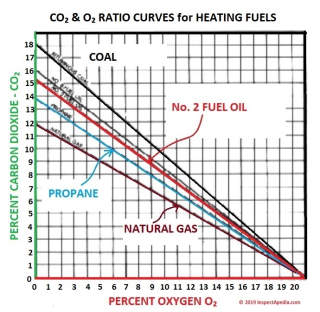 Robert
Robert
Although you're right that changing the combustion air volume will change the smoke level, the smoke level itself will not directly translate into a specific CO2 level.
Typically, for a modern high speed oil burner burning No. 2 fuel oil, you'd set the flame to just a trace of smoke - that is barely above zero, less than 1 on the smoke scale - then you'd open the air shutter until you see 12.0% CO2or 4.5% O2.
Beckett points out that at that point if you check the smoke level again it ought to look like "zero" on the scale.
Take a look also at the stack temperature, oil burner fuel unit pressure level, nozzle size and spray pattern and how those match to the combustion chamber design, cleanliness of the heat exchanger and stack (sooty pushes up stack temperature), draft, etc.
Also, a nice summary of these settings is given by Beckett at
- PROPER OIL BURNER ADJUSTMENT [PDF] available here at InspectApedia.com, retrieved anew 2019/12/27, original source: R.W. Beckett Corporation,
38251 Center Ridge Rd, North Ridgeville, OH 44039 USA, Tel: (800) 645-2876 https://www.beckettcorp.com/support/tech-bulletins/proper-burner-adjustment/
On 2019-12-26 by Robert - If my smoke level is zero what should my CO2 level be?
If my smoke level is zero what should my CO2 level be
Of I set the smoke test to 0/1 then when I adjust the air flow again for the CO2 11.5 and co at 5.5 will my smoke test figure not to up
This Q&A were posted originally
...
Continue reading at OIL BURNER WONT RUN or select a topic from the closely-related articles below, or see the complete ARTICLE INDEX.
Or see these
Recommended Articles
- AFUE DEFINITION, RATINGS
- CHIMNEY INSPECTION DIAGNOSIS REPAIR including backdrafting or blocked flue
- COMBUSTION AIR REQUIREMENTS
- COMPLETE COMBUSTION, STOICHIOMETRIC
- DRAFT MEASUREMENT, CHIMNEYS & FLUES
- DRAFT REGULATOR, DAMPER, BOOSTER
- OIL BURNER INSPECTION & REPAIR - home
- BOILER / FURNACE ROOM TROUBLE SIGNS
- OIL BURNER VISUAL INSPECTION
- OIL BURNER OPERATING TROUBLE
- OIL BURNER INSIDE TROUBLE
- OIL BURNER CO2 TEST
- OIL BURNER ELECTRODES
- OIL BURNER NOZZLE GUIDE
- OIL BURNER SMOKE TEST
- OIL BURNER WONT RUN - Diagnostic Steps - what to check in what order
- OIL BURNERS - home
- PRESSURE & TEMPERATURE SETTINGS, CONTROLS
Suggested citation for this web page
OIL BURNER CO2 TEST at InspectApedia.com - online encyclopedia of building & environmental inspection, testing, diagnosis, repair, & problem prevention advice.
Or see this
INDEX to RELATED ARTICLES: ARTICLE INDEX to HEATING OIL, OIL BURNERS, OIL FIRED HEATERS, OIL TANKS
Or use the SEARCH BOX found below to Ask a Question or Search InspectApedia
Ask a Question or Search InspectApedia
Try the search box just below, or if you prefer, post a question or comment in the Comments box below and we will respond promptly.
Search the InspectApedia website
Note: appearance of your Comment below may be delayed: if your comment contains an image, photograph, web link, or text that looks to the software as if it might be a web link, your posting will appear after it has been approved by a moderator. Apologies for the delay.
Only one image can be added per comment but you can post as many comments, and therefore images, as you like.
You will not receive a notification when a response to your question has been posted.
Please bookmark this page to make it easy for you to check back for our response.
IF above you see "Comment Form is loading comments..." then COMMENT BOX - countable.ca / bawkbox.com IS NOT WORKING.
In any case you are welcome to send an email directly to us at InspectApedia.com at editor@inspectApedia.com
We'll reply to you directly. Please help us help you by noting, in your email, the URL of the InspectApedia page where you wanted to comment.
Citations & References
In addition to any citations in the article above, a full list is available on request.
- [2] Beckett Corporation, 38251 Center Ridge Rd., North Ridgeville, OH 44039 440-327-1060 Email: sales@beckettcorp.com supplies residential and commercial oil burners for boilers, furnaces, and water heaters - see www.beckettcorp.com/
- [3] Thanks to Bottini Fuel service. Bottini Fuel is a residential and commercial heating oil distributor and oil heat service company in Wappingers Falls, NY and with offices in other New York locations. Bottini Fuel, 2785 W Main St, Wappingers Falls NY, 12590-1576 (845) 297-5580 more contact information for Bottini Fuel
- [4] Audels Oil Burner Guide, Installation, Servicing, Repairing, Frank D. Graham, 1947 edition (obsolete, out of print). See Brumbaugh, James E. Audel HVAC Fundamentals, Volume 2: Heating or see various versions of this guide available in editions from 1947, 1950, 1955, 1958, 1959, 1962, 1965, 1967, and at prices from around $3.00 to nearly $70.00 - useful for simple, clear, but not current, explanation of how heating equipment works. The original retail price was $1.00. Used copies are available
- [4a] Brumbaugh, James E., Audel HVAC Fundamentals, Volume 2: Heating, Audel [J Wiley]; All New 4th Edition edition (July 2, 2004) ISBN-10: 0764542079 ISBN-13: 978-0764542077
- Audels Oil Burner Guide, Installation, Servicing, Repairing, Frank D. Graham, 1940's edition (obsolete). Updated versions of this guide are available in various editions, 1947, 1950, 1955, 1958, 1959, 1962, 1965, 1967, and at prices from around $3.00 to nearly $70.00 - useful for simple, clear, but not current, explanation of how heating equipment works. The original retail price was $1.00. Used copies are available
- Domestic and Commercial Oil Burners, Charles H. Burkhardt, McGraw Hill Book Company, New York 3rd Ed 1969.
- National Fuel Gas Code (Z223.1) $16.00 and National Fuel Gas Code Handbook (Z223.2) $47.00 American Gas Association (A.G.A.), 1515 Wilson Boulevard, Arlington, VA 22209 also available from National Fire Protection Association, Batterymarch Park, Quincy, MA 02269. Fundamentals of Gas Appliance Venting and Ventilation, 1985, American Gas Association Laboratories, Engineering Services Department. American Gas Association, 1515 Wilson Boulevard, Arlington, VA 22209. Catalog #XHO585. Reprinted 1989.
- The Steam Book, 1984, Training and Education Department, Fluid Handling Division, ITT [probably out of print, possibly available from several home inspection supply companies] Fuel Oil and Oil Heat Magazine, October 1990, offers an update,
- Principles of Steam Heating, $13.25 includes postage. Fuel oil & Oil Heat Magazine, 389 Passaic Ave., Fairfield, NJ 07004.
- The Lost Art of Steam Heating, John Doe [Dan Holohan], 516-579-3046 FAX, at Amazon.com>
- Principles of Steam Heating, Dan Holohan, technical editor of Fuel Oil and Oil Heat magazine, 389 Passaic Ave., Fairfield, NJ 07004 ($12.+1.25 postage/handling).
- Principles of Home Inspection: Steam, Electric & Wall/Floor Heating, Carson Dunlop Associates, at Amazon.com>
- "Residential Steam Heating Systems", Instructional Technologies Institute, Inc., 145 "D" Grassy Plain St., Bethel, CT 06801 800/227-1663 [home inspection training material] 1987
- Boilers, Boiler Conversions, James E. Brumbaugh, ISBN 0-672-23389-4 (v. 1) Volume II, Oil, Gas, and Coal Burners, Controls, Ducts, Piping, Valves, James E. Brumbaugh, ISBN 0-672-23390-7 (v. 2) Volume III, Radiant Heating, Water Heaters, Ventilation, Air Conditioning, Heat Pumps, Air Cleaners, James E. Brumbaugh, ISBN 0-672-23383-5 (v. 3) or ISBN 0-672-23380-0 (set) Special Sales Director, Macmillan Publishing Co., 866 Third Ave., New York, NY 10022. Macmillan Publishing Co., NY
- Installation Guide for Residential Hydronic Heating Systems
- Installation Guide #200, The Hydronics Institute, 35 Russo Place, Berkeley Heights, NJ 07922
- The ABC's of Retention Head Oil Burners, National Association of Oil Heat Service Managers, TM 115, National Old Timers' Association of the Energy Industry, PO Box 168, Mineola, NY 11501. (Excellent tips on spotting problems on oil-fired heating equipment. Booklet.)
- In addition to citations & references found in this article, see the research citations given at the end of the related articles found at our suggested
CONTINUE READING or RECOMMENDED ARTICLES.
- Carson, Dunlop & Associates Ltd., 120 Carlton Street Suite 407, Toronto ON M5A 4K2. Tel: (416) 964-9415 1-800-268-7070 Email: info@carsondunlop.com. Alan Carson is a past president of ASHI, the American Society of Home Inspectors.
Thanks to Alan Carson and Bob Dunlop, for permission for InspectAPedia to use text excerpts from The HOME REFERENCE BOOK - the Encyclopedia of Homes and to use illustrations from The ILLUSTRATED HOME .
Carson Dunlop Associates provides extensive home inspection education and report writing material. In gratitude we provide links to tsome Carson Dunlop Associates products and services.


